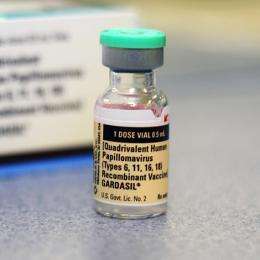HPV vaccine shows success in gay, bisexual men

A study by Monash University and Alfred Health found a 70 percent reduction in one type of human papillomavirus (HPV) in gay and bisexual men after the implementation of the school-based HPV vaccination program.
The HYPER2 study, published in Lancet Infectious Diseases, and led by Associate Professor Eric Chow, found there was a significant reduction in all four vaccine-preventable genotypes in gay/bisexual men aged 16-20 years following the introduction of the vaccine for boys in 2013.
Australia is one of the first and few countries that have both boys and girls vaccination programs for HPV. The vaccine covers four genotypes: 6/11/16/18. Genotypes 6/11 cause about 90 percent of the genital wart cases and genotypes 16/18 cause about 70 percent of cervical and anal cancers.
This is the first study to show that the implementation of the gender-neutral program can reduce high-risk anal HPV and potentially reduce the incidence of anal cancer in gay and bisexual men.
This repeated cross-sectional study recruited 400 gay and bisexual men with a median age of 19 years from sexual health clinics and the community in Melbourne.
The results are compared with the HYPER1 group of 200 gay/bisexual men pre-vaccination in 2010-2012 and the HYPER2 group of 200 gay/bisexual men post-vaccination in 2017-2018.
It showed a reduction in anal quadrivalent genotypes from 28 percent down to 7.3 percent and penile quadrivalent genotypes also lower in the post-vaccination group 6.1 percent compared to 11.9 percent.
Anal cancer incidence has increased globally among men over the last three decades. It is overrepresented among gay and bisexual men, particularly those living with HIV.
A meta-analysis estimated the incidence of anal cancer to be 45.9 per 100,000 among HIV-positive MSM. Results from the HYPER2 study suggest that male vaccination may lead to a potential reduction in anal cancer among gay and bisexual men in Australia, which is similar to the reduction in cervical cancer among Australian women after the HPV vaccination program launched in 2007.
"Australia has a very successful HPV vaccination program for both boys and girls with high vaccine coverage," Associate Professor Chow said.
"The vaccine is effective in reducing HPV-related diseases and showing some promising evidence that this may lead to a reduction in HPV-related cancer in the future."
More information: Eric P F Chow et al, Prevalence of human papillomavirus in young men who have sex with men after the implementation of gender-neutral HPV vaccination: a repeated cross-sectional study, The Lancet Infectious Diseases (2021). DOI: 10.1016/S1473-3099(20)30687-3




















